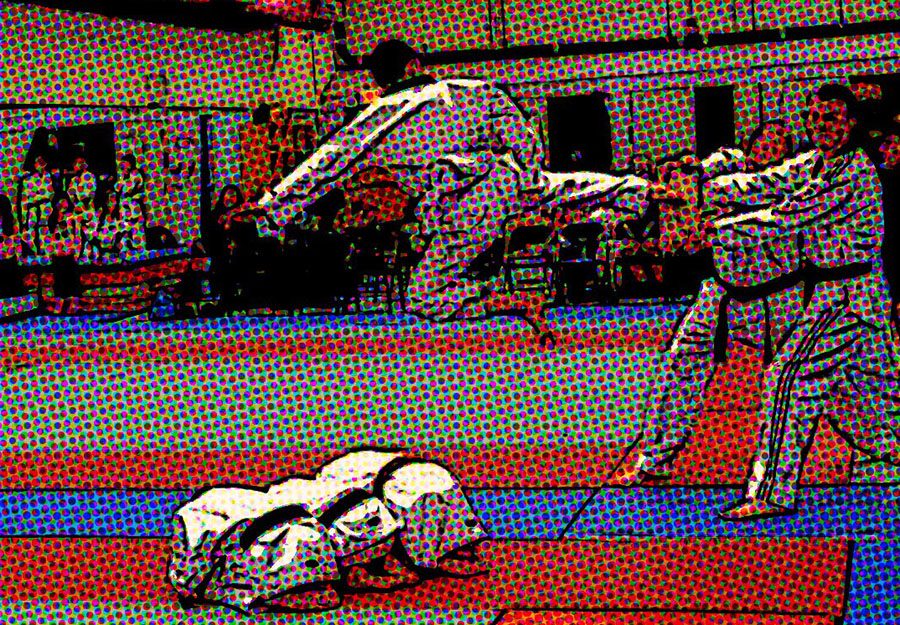Your donation will support the student journalists of Iowa City High School. For 2023, we are trying to update our video and photo studio, purchase new cameras and attend journalism conferences.
Fighting Fit!
We join our heroes, the mettlesome Ryan Carter‘20, Timmer Penny ‘19, and Aubryn Kaine ‘20, as they conquer the challenges of taekwondo...
February 1, 2019
Timmer Penny

Everyone finds something different to enjoy about the activities they love. Timmer Penny ‘19 said his experience with taekwondo created an outlet for his energy.
“Taekwondo was just great exercise, especially for a young kid,” Penny said. “There was a long period where I wasn’t doing any exercise and the only reason I could be in shape was because of [taekwondo].”
Penny started in taekwondo in elementary school and worked hard at it for several years before dropping the martial art in his freshman year.
“The only reason I stopped was because I was playing football and those practices were getting in the way, and school was actually getting really intense, so I stopped to focus on football and my grades,” Penny said. “It would’ve been fun to stay, but it was more worth it to concentrate on school.”
Despite having dropped taekwondo, Penny has fond memories of his time practicing it, including his stints in tournaments.
“My favorite part was actually learning the martial arts and then going and competing in tournaments. That was the most fun for me, was learning the skills to beat others in tournaments,” he said. “It’s just not like anything I’d ever done before. It was really fun–you’d go there and it was kind of like any other tournament, you’d wait around, wait for your time, and then you put on your gear and you spar other people. You win medals, you gain recognition, and it’s just a lot of fun. I had a great time.”
Still, it wasn’t all fun and games. Penny said he had to work hard to hone his skills.
“The hardest part was getting stuff right. Martial arts teachers have to be very strict. They have to make sure you know what you’re doing, so you mess up one little thing and you get in a lot of trouble for it and they basically pressure you until you know how to do it perfectly,” he said. “The hardest part was learning new things and then perfecting them, but after a while, once you’ve got them down, it is worth it.”
Penny’s work paid off: he met several of his goals, both tangible and in principle. The goal of getting a black belt, which Penny achieved during his years in taekwondo, came as he progressed through belt levels.
“I didn’t really start with that goal in mind, but once I achieved it, I was like, ‘I mean, I can keep going, there are more belts I can achieve, but…it’s a good time to stop.’”
But concrete achievements weren’t the only rewarding part about Penny’s experience with taekwondo.
“When you break your first board, that’s always pretty nice,” Penny said, “but the best thing for me was finally reaching the top. Most of the time when I was there, I was a student and I was looking up to these people who were really good and who knew everything, and [my teacher] was like, ‘Watch how he does it,’ and eventually, after doing it for long enough, I became that person, and he was like, ‘Watch how Timmer does it. Do it just like he does. Give them an example,’ and once I got to that point, that’s when it felt pretty special to have stuck with it for so long.”
Penny said that he achieved his goals in taekwondo, and he’s satisfied with his experience even though it isn’t ongoing.
“I definitely felt satisfied with how far I went, and it was just a lot of fun,” Penny said. “That was a pretty special moment for me…realizing that I’ve come a [long] way from where I started.”
Ryan Carter
Ryan Carter ‘20 has been practicing taekwondo for 11 years. Nevertheless, he says he has never stopped learning.

“One of the guys I used to train with, Michael Clapp, he said, ‘Once you get your black belt, you re-learn everything that you learnt up till then,’” Carter said. “Learning how to do correct movements and techniques is never the hard part. The hard part is having the control when executing them…especially when teaching younger kids. It’s also the same thing with music. You can teach an eighth-grade player to play some insanely hard thing…but if they don’t have the technicality musically to play it, [they can’t]. It’s the same thing with martial arts.”
Control is a crucial aspect of taekwondo, Carter said.
“When I started doing it competitively, there wasn’t really a youth competitive team, so my brother and I would train with the collegiate people, and the only reason my dad let us do that is that he knew the level of control all those guys had while they were sparring,” Carter said. “Some of my friends might not say this–that I, as a person, have self-control when I do things–but it does teach you about self-control and to realize the things that you can and can’t control. My teacher…she was almost like another parent to me, the way that she trained me and taught me and instilled a lot of morals.”
Carter said the control and honor system of taekwondo were integral to his performance during the half-decade he spent in the competitive circuit.
“You end up meeting a lot of people and you learn something new from every person that you meet. There’s this one guy–when we’d compete, we were in the same division…we would spar each other a lot. Right before our fight, we would be talking casually and joking around…then they’d call our names up and we stepped in the ring, and we were aiming to win against the other person,” Carter said. “You view each other as equal. There’s this mutual respect, whether you know the person or not, through the sport. Of course you’re both trying to win…but because of the way they are and the way they fight, you can view them as equals.”
As he has grown up, Carter said, taekwondo’s presence in his life has evolved.
“It was my sport growing up. Some kids did club soccer, others did running–for me it was just taekwondo. That’s just what I did and I enjoyed doing and my whole family did,” Carter said. “I started doing it competitively when I was about eight or nine, and then I stopped when I was 15, because that’s when you can start going for knockout shots and I valued my brain a little bit. I had other things I wanted to do–like for trombone, you need to use your hands. So I stopped doing it competitively.”
Now, though, Carter said his time in taekwondo has shaped him in more ways than one, including giving him an ideal to live up to in his daily life.
“Some of the people I’ve trained with, I still look up to them as people. They might make a stupid joke, but when it comes down to it, I know they’re a reliable person, they’re a good person, I can trust them,” Carter said. “I like to think I’m sort of like that sometimes, where I can be the stupid guy that I am and do all this other wacky, stupid stuff, but then when it really comes down to it I can be there, helping people out and doing what needs to be done.”
Aubryn Kaine

Taekwondo is an enduring presence in Aubryn Kaine 20’s life, an activity to which she has been dedicated for over 12 years.
“I started when I was four and a half years old at Master Chol Choe’s Black Belt Academy,” Kaine said. “I am a third-degree black belt. I got that when I was nine years old.”
Kaine’s journey with taekwondo has involved multiple stages of learning, practice, and refinement.
“A lot of it was figuring out how to move my body to be able to copy what I was seeing someone else do,” Kaine said. “Once I stopped being able to learn anything new, then it became more about, ‘How can I help someone else learn what I know?’”
The skills Kaine gained at learning don’t just benefit her in the dojo, however.
“The stuff that we do at school–the patterns that I learned taekwondo in, the patterns that I learn academics in–it’s easier to focus in school when I do taekwondo,” she said.
“[Taekwondo]’s what started me in athletics, which makes me so I don’t get as irritated.”
Much of the knowledge Kaine has learned from taekwondo comes from the martial art’s dedication to core morals.
“The tenets of taekwondo are courtesy, integrity, perseverance, self-control, and indomitable spirit, and I memorized those before I was five. Those are like life skills of, ‘This is how I want to be in the world,’” Kaine said. “It also means that I never…was afraid of other people, because I always knew that if something got too far, I could protect myself.”
Despite her many years of experience, Kaine still has more she wants to achieve in her taekwondo career.
“There’s a limit to getting my fourth-degree black belt: I have to be 20 years old. You can teach once you’re 20. I would have gotten my fourth-degree black belt when I was 15, but I was too young, so I’m still waiting,” Kaine said. “I’m definitely planning on getting my fourth done sometime during college; I’m thinking to teach in some way.”
The enthusiasm for taekwondo that drives Kaine to teach comes from her belief in taekwondo’s merits.
“I think that it’s a really good experience for everyone, and especially with some of the stuff with Mollie Tibbetts–needing to protect yourself, learning how to do it, and having that be a basic part of who you are, has been really, really good for me, and I think it teaches some skills that I see a lot of people don’t have,” she said. “It makes it a lot harder to go through life if you don’t have these central core values.”
Kaine also said that there are many reasons to practice and love taekwondo, ranging from competition to self-improvement.
“People do…it as a sport, especially sparring, which is what the Olympics are. That’s really competitive and it’s pretty similar to football, just with individuals,” Kaine said. “However, there is another aspect of taekwondo that I like more: doing it as a part of your life, so it’s less of a competition. It’s more than a sport.”



